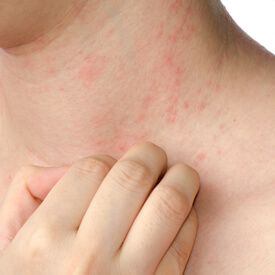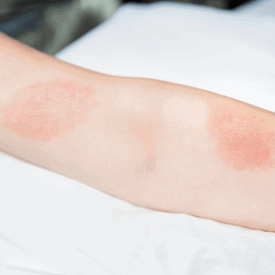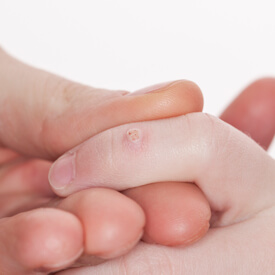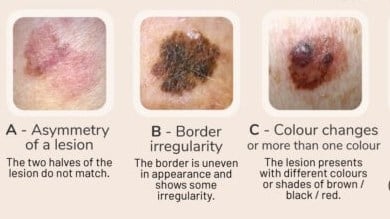Texture improvement, collagen production, minimized wrinkles, and anti-inflammatory properties are benefits of using retinoids!
Moles in Fort Washington, PA
ABOUT MOLES
Dr. Aradhna Saxena of the Dermatology and Skin Cancer Institute offers routine mole checks for patients throughout the greater Philadelphia area. Most people currently have a mole of some sort on their body somewhere. A mole is a growth on the skin that results from a cluster of pigmented cells. During mole checks, we examine, measure, and document the size, shape, and growth of moles on the body to monitor them and ensure they are safe and not changing or cancerous. Moles can be brown, black, or a combination of the two colors and can appear alone or in groups. Moles can also be flat or appear as a round bump. Although most are harmless, some can develop into cancer. If you have moles on your body and are unsure about the health of one, or if one becomes bothersome, it is necessary to see a professional — especially if one begins to change in size or shape or begins to itch or bleed.
CAUSES
Moles occur when cells in the skin called melanocytes grow in a cluster instead of being spread throughout the skin. These cells make the pigment that gives skin its natural color. Moles may darken after exposure to the sun, during the teen years, and during pregnancy.
SYMPTOMS
Dr. Saxena recommends that patients watch for any changes in their moles and get mole checks on a regular basis. By using the ABCDE test to determine whether a mole could be cancerous, you can easily recognize what to look for. Your mole could be cancerous if the following characteristics are present:
- Asymmetrical: They are not even or equal in size when divided in half
- Borders: They have irregular or scalloped borders
- Color: They begin to change color or have an uneven color
- Diameter: They are larger than 6mm in diameter
- Evolving: They begin to evolve (grow or change) in color, shape, size, or height
TREATMENT OPTIONS
Most moles don’t warrant treatment unless they become suspicious or cancerous or cause discomfort, irritation, or cosmetic issues. In these situations, Dr. Saxena or a member of her professional medical team may need to remove the mole(s). In surgical excision, the area around the mole will be locally numbed, and a scalpel or similar device will be used to remove the mole and some surrounding skin. The wound will then be closed with stitches. Sometimes, if the mole is only surface level, a surgical shave can be performed in which the area is numbed and a small blade is used to cut all around and beneath the mole. Stitches are not required for this method.
SCHEDULE YOUR MOLE CHECK!
Whether you have moles that are bothersome, unattractive, or unusual in appearance (that could potentially be a sign of melanoma), it is time to contact the Dermatology and Skin Cancer Institute to figure out your treatment options. Our offices in Fort Washington, Lansdale, and Willow Grove, PA specialize in treating a wide variety of moles, from benign to cancerous. If we find that you have a mole that is cancerous, we will determine the best approach for your care.















